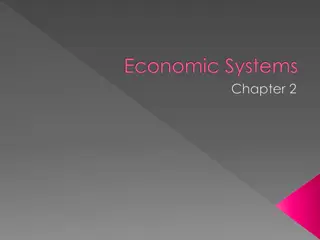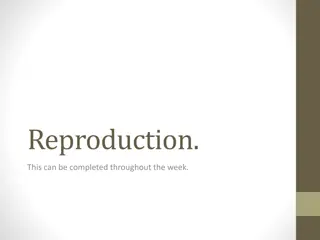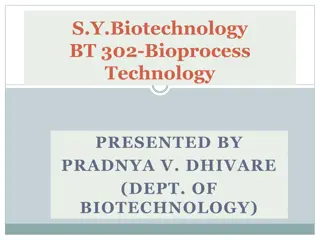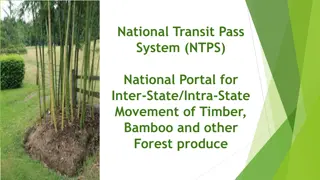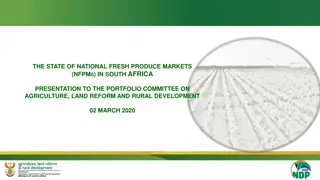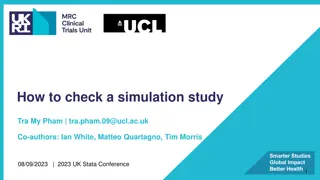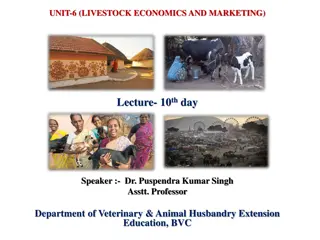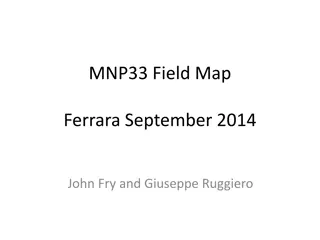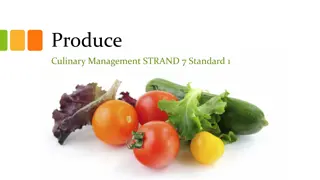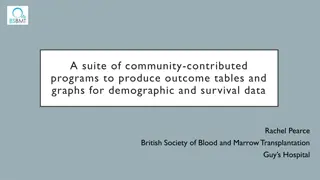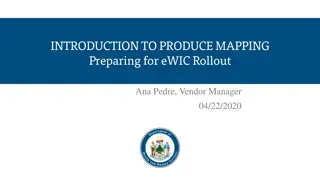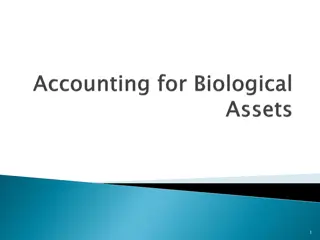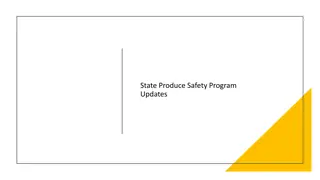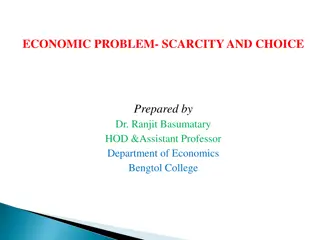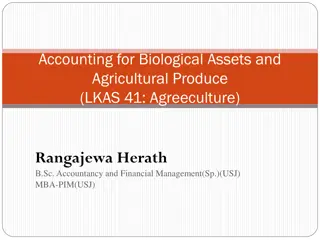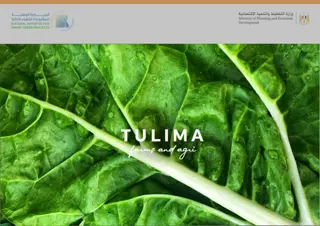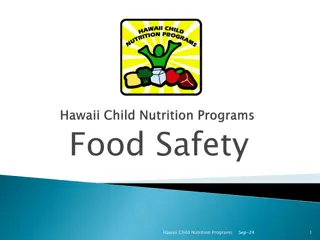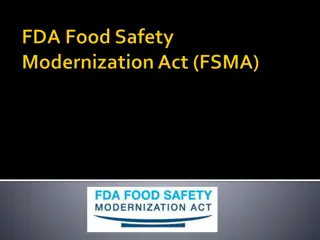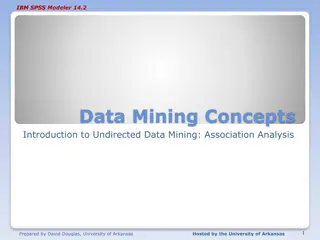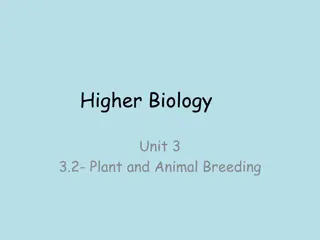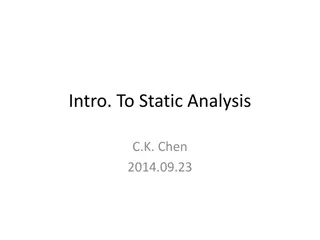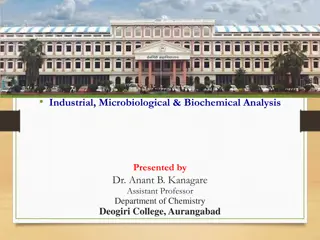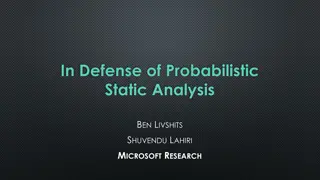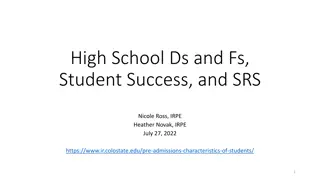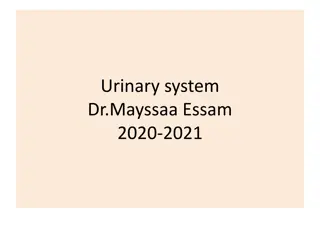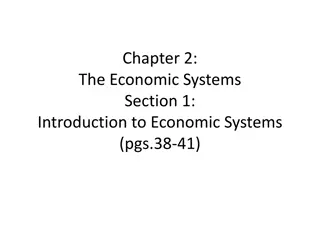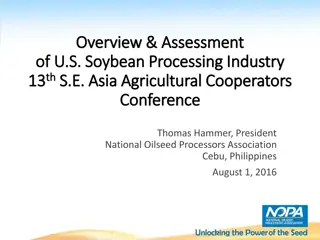Algorithm Analysis
Algorithm analysis involves evaluating the efficiency of algorithms through measures such as time and memory complexity. This analysis helps in comparing different algorithms, understanding how time scales with input size, and predicting performance as input size approaches infinity. Scaling analysi
1 views • 30 slides
Market Analysis (Project Formulation)
This detailed guide covers essential aspects of market analysis and project formulation in entrepreneurship, including feasibility analysis, techno-economic analysis, market demand analysis, steps in market analysis, and factors to consider for market demand analysis. Explore how to assess market de
2 views • 30 slides
Object-Oriented Analysis and Design Workflow
Object-Oriented Analysis (OOA) is a crucial step in software development to produce a logical model of the system's functionality. It involves requirements analysis, use case analysis, and use case realization to identify classes, responsibilities, attributes, and associations. The process includes
11 views • 90 slides
Static Analysis Techniques Overview
Explore static analysis techniques such as syntactic analysis, dataflow analysis, and model checking. Understand the concept of basic blocks in static analysis and their boundaries. Dive into the opportunities provided by static analysis in summarizing program behavior without executing it.
9 views • 27 slides
Chronic Myeloid Leukemia
Chronic myeloid leukemia (CML), or chronic myelogenous leukemia, is a slow-growing form of cancer that affects the bone marrow and blood. Like acute myeloid leukemia, CML originates in the myeloid cells. When functioning properly, myeloid cells produce mature red blood cells, platelets and non-lymph
2 views • 7 slides
Understanding Economic Systems: Chapter 2 Overview
All societies have economic systems to provide for the wants and needs of their people. An economic system functions to produce and distribute goods and services to consumers. The key economic questions involve what goods/services to produce, how to produce them, and who will consume them. Society's
0 views • 35 slides
Comprehensive Cost Management Training Objectives
This detailed training agenda outlines a comprehensive program focusing on cost management, including an overview of cost management importance, cost object definition, cost assignment, analysis, and reporting. It covers topics such as understanding cost models, cost allocations, various types of an
2 views • 41 slides
Understanding Reproduction: Pollen, Eggs, and Life Cycles in Plants
Reproduction in plants involves the transfer of pollen to eggs, leading to fertilization and the formation of new life. Male animals produce sperm, while females produce eggs, which fertilize when they meet. Different animals exhibit external or internal fertilization, with varying numbers of offspr
1 views • 13 slides
Understanding Bioprocess Technology and its Applications
Bioprocess technology involves utilizing living cells or their components like bacteria and enzymes to produce desired products through fermentation. This field covers a range of processes, including microbial bioprocesses, enzyme production, metabolite synthesis, recombinant products, and transform
0 views • 15 slides
National Transit Pass System (NTPS) for Forest Produce Transportation
The National Transit Pass System (NTPS) is a digital platform designed to streamline the issuance and monitoring of transit permits for the transportation of timber, bamboo, and other forest produce across states. It aims to replace manual processes, enhance transparency, and facilitate agro-forestr
0 views • 14 slides
The State of National Fresh Produce Markets in South Africa
Presentation to the Portfolio Committee on Agriculture, Land Reform, and Rural Development, highlighting the importance of National Fresh Produce Markets (NFPMs) in South Africa. The presentation covers the challenges, recommendations, and key details such as the number of NFPMs operating, turnover,
0 views • 15 slides
Understanding Economic Systems and Basic Questions
Economic systems are the foundation of societies, organizing production and distribution of goods. Three basic questions drive economic systems: what goods to produce, how to produce them, and for whom. Traditional, command, and market economies each address these questions differently, relying on c
1 views • 11 slides
How to Check a Simulation Study: Methods and Considerations
Simulation studies are often used to evaluate statistical methods and study power, but they can sometimes produce misleading results. This work discusses strategies to assess and improve the quality of simulation studies, drawing on experiences and considerations outlined in relevant literature. A s
0 views • 31 slides
Powers to Summon Persons and Produce Documents under GST and Central Excise Acts
The content discusses the power of the proper officer under the Goods and Services Tax (GST) Act and the Central Excise Act to summon individuals to provide evidence and produce documents for inquiries. It also highlights the judicial significance of such inquiries and the obligations of individuals
0 views • 18 slides
Understanding Production Decision Making in Livestock Economics and Marketing
Dr. Puspendra Kumar Singh discusses the Theory of Production in livestock economics, covering topics such as how much to produce, how to produce, and what to produce. He explains the factors affecting production decisions, including input-output relationships and different types of production functi
1 views • 17 slides
Mapping of MNP33 Field in Ferrara - September 2014
Mapping the MNP33 Field in Ferrara in September 2014 involved precise measurements using 60 3-D Hall probes to produce a detailed field map of the area, crucial for NA62 physics analysis. The project required determination of sensor angles, correction of residual fields, and addressing systematic un
0 views • 45 slides
The Palm - A Superlative Brand of Hospitality
The Palm, established in 2014, aims to offer exceptional sleeping, relaxing, working, dining, and drinking experiences. With elegantly designed bedrooms, locally sourced produce, dedicated spaces, and an environmentally conscious approach, The Palm sets itself apart. Access to exclusive resident-onl
2 views • 5 slides
Data Analysis and Passage Analysis Project Proposal
This project proposal by Anthony Yang focuses on developing a Java program for data analysis and passage analysis. The motivation behind the project is to gain more knowledge in computer science and statistics-related topics while utilizing technology to extract useful insights from data. The propos
0 views • 8 slides
Effective Produce Management in Culinary Practice
Understand the importance of quality produce, considerations for purchasing fruits, proper storage techniques, washing produce, preventing enzymatic browning, and cooking using both dry and moist heat methods.
0 views • 10 slides
Understanding Economic Systems and Questions
Explore the concepts of traditional, command, and market economies, and how they answer key economic questions. Learn about economic systems in Canada, Cuba, and Brazil, and grasp the fundamental economic questions of what to produce, how to produce, and for whom to produce. Understand the basics of
0 views • 26 slides
Community Programs for Outcome Data Analysis in Stem Cell Transplantation
A suite of community-contributed programs is utilized by the British Society of Blood and Marrow Transplantation at Guy's Hospital to analyze demographic and survival data related to stem cell transplantation. The programs aim to produce outcome tables and graphs that aid in retrospective studies, i
0 views • 13 slides
Maine eWIC Rollout: Introduction to Produce Mapping
Prepare for the eWIC rollout in Maine by understanding the importance of produce mapping, submitting UPCs for approval, and ensuring items are on the approved product list. Learn how eWIC streamlines transactions and offers flexibility to participants.
0 views • 12 slides
Accounting for Biological Assets and Agricultural Produce
At the end of this lesson, you will be able to identify the principal issues in accounting for biological assets and agricultural produce at the time of harvest. Topics include the recognition, measurement, presentation, and disclosure of biological assets in financial statements. Questions regardin
0 views • 26 slides
State Produce Safety Program Updates in Various Jurisdictions
Updates on state produce safety programs in Massachusetts, Maryland, New Hampshire, and Rhode Island. Includes details on educational partners, funding, inspections, challenges faced, upcoming initiatives, and support programs.
0 views • 13 slides
Understanding the Economic Problem: Scarcity and Choice
The economic problem arises from the scarcity of resources relative to unlimited wants, leading to the necessity of making choices. This results in the central questions of what to produce, how to produce, and for whom to produce, which are inherent in every economy. Decision-making processes involv
0 views • 7 slides
Accounting for Biological Assets and Agricultural Produce (LKAS 41: Agriculture) by Rangajewa Herath
This content provides insights into the accounting standards for biological assets and agricultural produce under LKAS 41, discussing classification, presentation, measurement, gain or loss recognition, and disclosure requirements. It covers the unique nature of biological assets, the scope of LKAS
0 views • 20 slides
Transforming Tulima Profile A 20 Feddan Farm into a High-Yielding, Climate-Positive Pilot Farm
Tulima Profile A 20 Feddan farm in El Beheira is pioneering high-tech, precise, and environmentally friendly agriculture practices. By leveraging hydroponic techniques and cutting-edge farming methods in state-of-the-art greenhouses, Tulima produces delicious, pesticide-free produce year-round with
0 views • 6 slides
Promoting Health and Wellness Through Access to Fresh Produce
Empower communities to make healthier choices by increasing access to fresh produce. Addressing obesity rates in Alabama, the initiative focuses on educating, providing resources, and bridging food insecurity gaps. By supporting local agencies and food banks, encouraging healthy lifestyles, and prom
0 views • 13 slides
Ensuring Food Safety in Hawaii Child Nutrition Programs
Food safety practices and guidelines are essential in Hawaii Child Nutrition Programs to prevent diseases like Rat Lungworm. Measures include thorough inspection and rinsing of produce, compliance with regulations for washing produce, and following protocols such as HACCP principles. Regular monitor
0 views • 25 slides
Agricultural Water Safety Regulations Overview
The final Produce Rule and Preventive Controls Rule, effective since November 13, 2015, set criteria for microbial contamination in agricultural water. Generic E. coli levels are key indicators, affecting water uses in post-harvest and production. Criteria like Geometric Mean and Statistical Thresho
0 views • 43 slides
Introduction to IBM SPSS Modeler: Association Analysis and Market Basket Analysis
Understanding Association Analysis in IBM SPSS Modeler 14.2, also known as Affinity Analysis or Market Basket Analysis. Learn about identifying patterns in data without specific targets, exploring data mining in an unsupervised manner. Discover the uses of Association Rules, including insights into
0 views • 18 slides
Understanding Dry Eye: Causes, Symptoms, and Diagnosis
Dry eye is a common condition that occurs when your eyes do not produce enough tears or produce tears with the improper chemical composition. This can result from various factors such as aging, hormonal changes, medications, and environmental irritants. Symptoms include stinging, gritty sensation, f
0 views • 13 slides
Understanding Plant and Animal Breeding Techniques
Selective breeding is a key technique used by breeders to manipulate an organism's heredity in order to obtain desirable characteristics in crop plants and livestock. This process aims to produce new and improved cultivars or breeds that are beneficial to humans. Through heritable characteristics su
0 views • 27 slides
Introduction to Static Analysis in C.K. Chen's Presentation
Explore the fundamentals of static analysis in C.K. Chen's presentation, covering topics such as common tools in Linux, disassembly, reverse assembly, and tips for static analysis. Discover how static analysis can be used to analyze malware without execution and learn about the information that can
0 views • 54 slides
Industrial, Microbiological & Biochemical Analysis - Course Overview by Dr. Anant B. Kanagare
Dr. Anant B. Kanagare, an Assistant Professor at Deogiri College, Aurangabad, presents a comprehensive course on Industrial, Microbiological, and Biochemical Analysis (Course Code ACH502). The course covers topics such as Industrial Analysis, Microbiological Analysis, and Biochemical Analysis. Dr. K
0 views • 16 slides
Benefits of Probabilistic Static Analysis for Improving Program Analysis
Probabilistic static analysis offers a novel approach to enhancing the accuracy and usefulness of program analysis results. By introducing probabilistic treatment in static analysis, uncertainties and imprecisions can be addressed, leading to more interpretable and actionable outcomes. This methodol
0 views • 11 slides
High School Ds and Fs Analysis for Student Success at CSU
Analyzing the association between high school D or F grades and first-year success at Colorado State University (CSU). The study explores the usefulness of D or F grades as a metric for classifying students as Student Retention Students (SRS). Various methodological approaches like CART Analysis, De
0 views • 15 slides
Overview of the Urinary System and Kidney Function
The urinary system, also known as the renal system, includes the kidneys, ureters, bladder, and urethra. Its main functions are waste elimination, blood volume regulation, electrolyte control, and pH regulation. The kidneys, bean-shaped organs with a complex structure, filter blood to produce urine.
0 views • 35 slides
Understanding Different Economic Systems
Introduction to economic systems reveals how societies address scarcity by determining what to produce, how to produce, and for whom. Traditional, command, market, and mixed economies are explored, highlighting their distinct approaches. Traditional economies rely on customs, command economies are g
0 views • 9 slides
Analysis of U.S. Soybean Processing Industry and Critical Challenges
This analysis delves into the U.S. soybean processing industry, highlighting the significant role played by NOPA members who operate processing plants across states. The members produce food, feed, and fuel from soybeans, emphasizing their crucial contributions to various sectors. Additionally, the
0 views • 33 slides





